Weekly recap:
Global markets were hit by another bout of volatility last week. Risk assets sold off last week due to AI valuation concerns and ambiguity over the Federal Reserve’s next steps for interest rates. At some point last week, the three major indices were 5% below their record highs amid a jittery market.
Interestingly, Nvidia’s impressive earnings report and the upbeat commentary from its CEO failed to sustainably reverse negative momentum, and investors continued to question rallies in firms seen as AI leaders. Should AI-related concerns continue, it would be difficult for risk assets to rally meaningfully.
Beyond AI, the minutes to the FOMC were more hawkish, sending December rate-cut expectations to 27% from 90% ahead of the October meeting. Policymakers highlighted a lack of recent data as an obstacle to further rate cuts. However, the NY Federal Reserve President John Williams on Friday adopted a more dovish tone, sending December rate cut expectations sharply higher to over 70% once again.
The tech-heavy Nasdaq fell 2.7%, while the S&P 500 and the Dow Jones Industrial Average dropped 1.9% last week. Meanwhile, the USD rallied to a 6-month high.
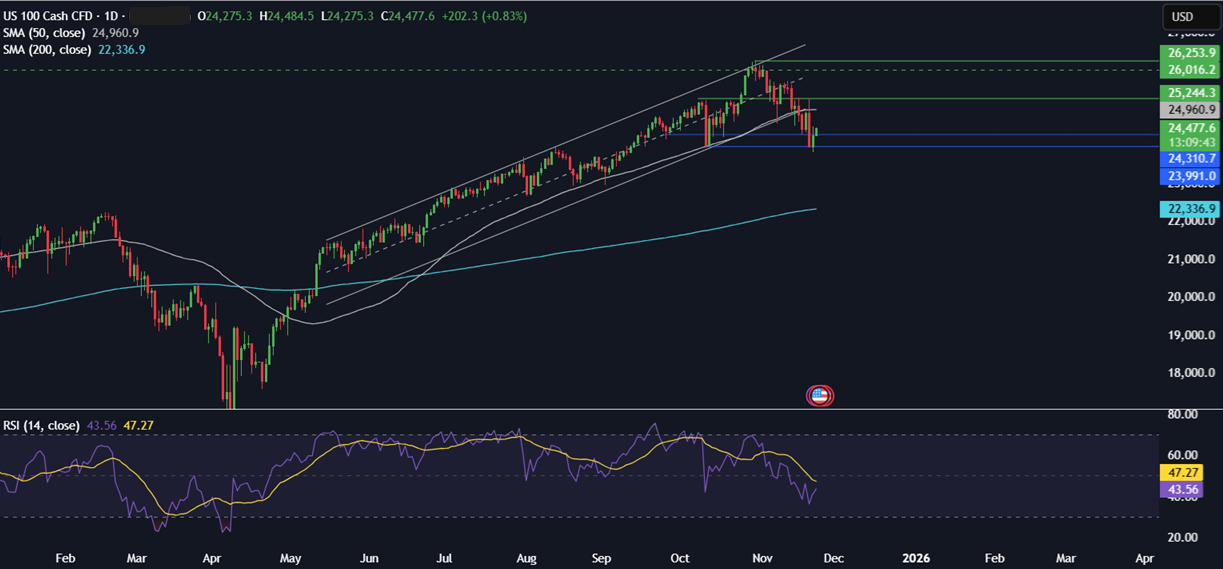
Looking ahead to this week, liquidity will be thin owing to the Thanksgiving holiday.
US Retail Sales (Tuesday)
The delayed September retail sales are scheduled for Tuesday, 25 November, just ahead of Black Friday, one of the busiest shopping days of the year, and will show whether shoppers maintained their momentum heading into the government shutdown. Expectations are for sales to rise 0.4% MoM, down from 0.6% MoM in August. Solid retail sales will be viewed as a gauge of strength of the consumer and are expected to cap off a solid quarter of spending despite sticky inflation and some anxiety surrounding job security. The data comes after Friday’s data showed that consumer sentiment fell in November to one of the lowest levels on record. The University of Michigan sentiment drops to 51 in November as consumers remained frustrated by the persistence of high prices and weakening incomes. So far, deteriorating confidence hasn’t translated into weaker sales. Solid retail sales could boost the USD. The US Conference Board Consumer Confidence will also be released.
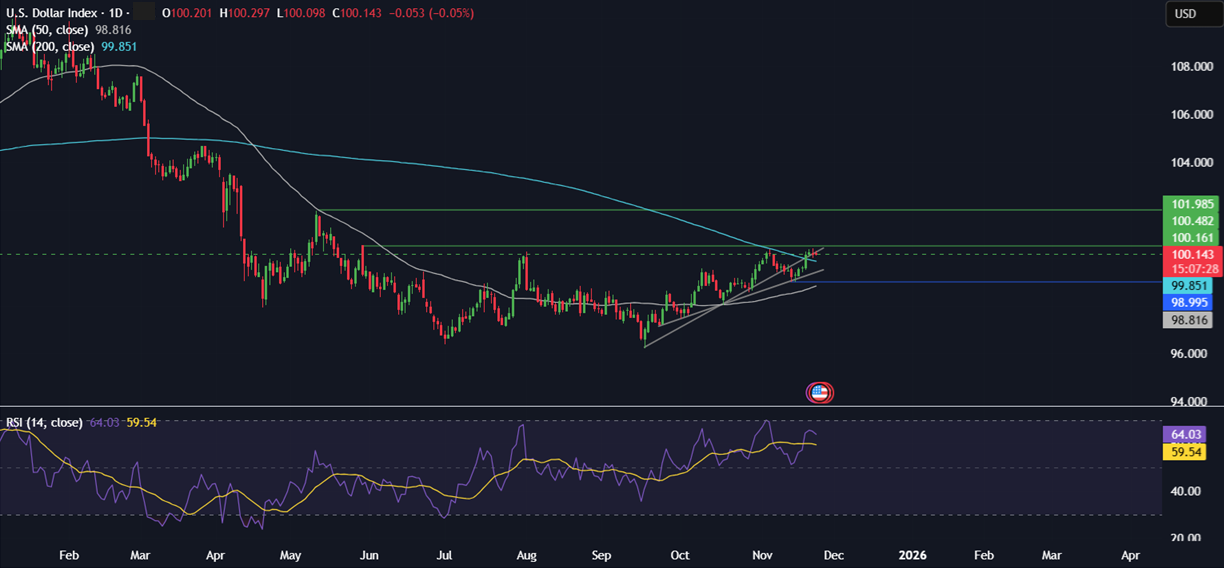
Australian CPI (Wednesday)
Australian inflation data comes as the market is pricing in 92% of the RBA leaving interest rates on hold at the December meeting, with no 25-basis-point rate cut fully priced in for the coming months. The data also comes after the RBA’s November minutes, which highlighted a cautious, data-dependent approach amid persistent inflation pressures and a still-tight labour market. The RBA noted that rates were likely restrictive and that policymakers could afford to be patient with further cuts. Signs of hotter-than-expected inflation could prompt the market to rein in further rate-cut expectations for 2026, which could lift the AUD/USD.
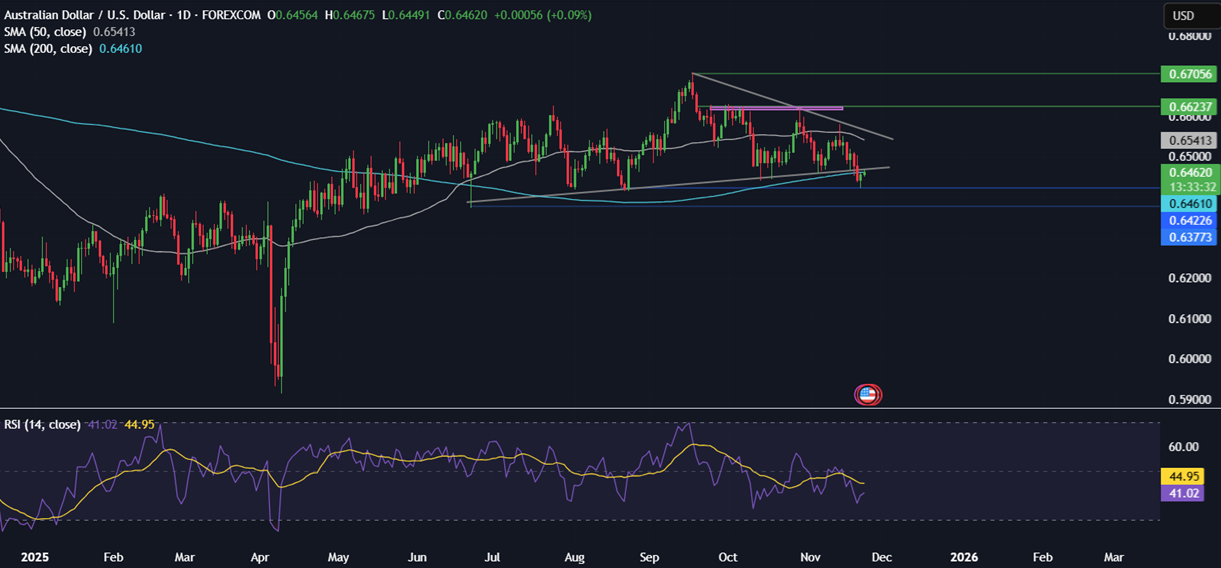
RBNZ rate decision (Wednesday)
The RBNZ surprised the market by cutting the official cash rate (OCR) by 50 basis points to 2.5% at the October meeting, a larger cut than the 25 basis points expected. As a result, the central bank has now eased rates by 300 basis points from the peak of 5.5%. The statement said the committee remains open to further reductions, as required, to bring inflation back to the 2% target sustainably. The RBNZ also downgraded its description of economic activity from growth to ‘economic activity is weak,’ indicating a clear softening in tone and supporting the view that further rate cuts could be expected. The outlook is expected to be updated to show a terminal rate of 2.15%, which would align with market pricing and indicate that the RBNZ will cut by 25 basis points at the meeting to 2.25%. The market sees a 50% chance of a further 25 paces clean cut in February. A dovish-sounding RBNZ could pull NZD/USD lower.
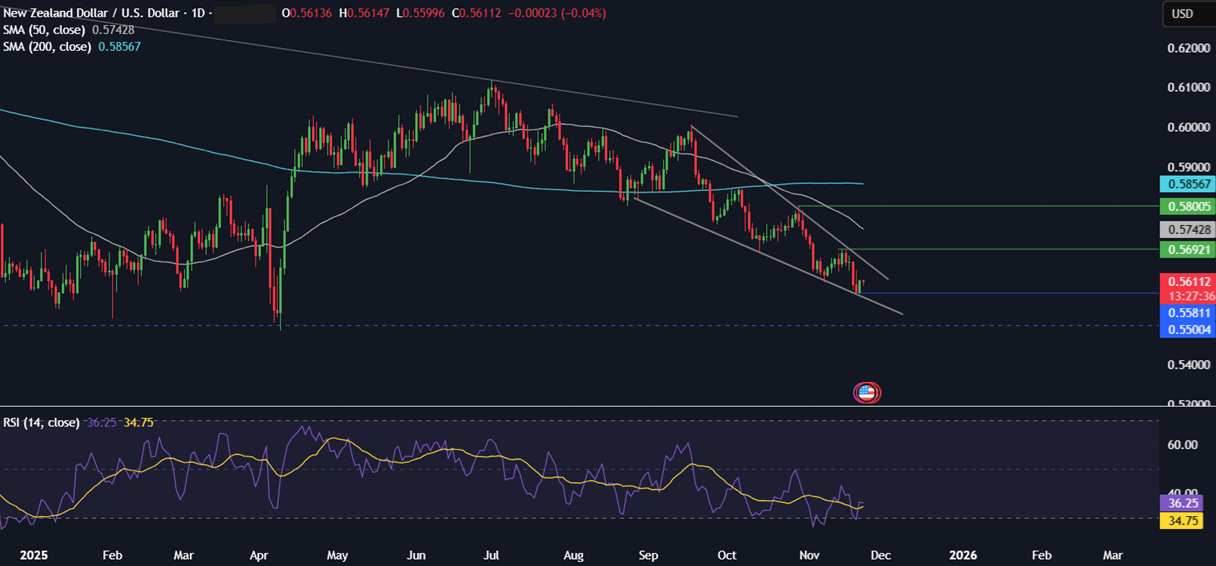
UK Budget (Wednesday)
The Chancellor has a tough job ahead of her as she looks to plug a £20-£35 billion funding gap while also giving herself some headroom. Heavy spending, weak growth, and a productivity downgrade paint a difficult picture that calls for fiscal tightening. The Chancellor must raise taxes sufficiently so that her budget is credible and the bond market sees that. However, if she goes too far with tax hikes, it could further slow the growth narrative.
With gilt yields rising and the pound weakening sharply in recent weeks, the budget could prove a make-or-break moment. Aggressive tax increases could open the door to a potential political crisis, challenging PM Starmer’s ability to govern. However, if the budget lacks credibility, it could push yields higher without benefiting the pound.
The Bank of England is expected to cut interest rates at its December meeting following a softer-than-expected CPI report. Aggressive tax hikes could slow the economy and cool inflation faster, fuelling expectations of further BoE rate cuts next year, which could pull GBP/USD lower.
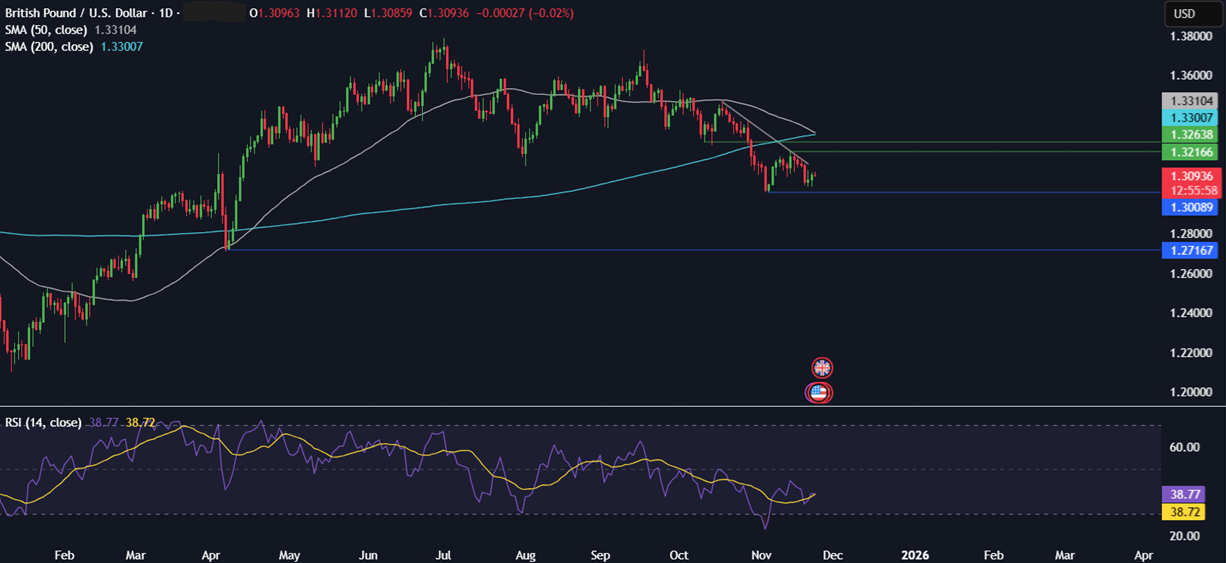
Tokyo CPI (Thursday)
In October, the CPI rose to 2.8% YoY, up from 2.5% in September, marking a stronger-than-expected rise in prices. This month’s data comes after massive stimulus efforts and mixed messages from BoJ Governor Ueda on when the central bank could hike rates again. The yen fell to a 10-month low last week after PM Takeichi’s cabinet announced stimulus plans of around $135 billion, the largest since 2022. Japanese bond yields have surged amid concerns about the country’s fiscal credibility. The yen has fallen 6% since PM Takaichi took office less than two months ago. The Japanese Finance Minister, Katayama, has warned verbally of intervention to support the yen. Even a surprise upside to Tokyo CPI may not be enough to support the yen and pull USD/JPY lower.
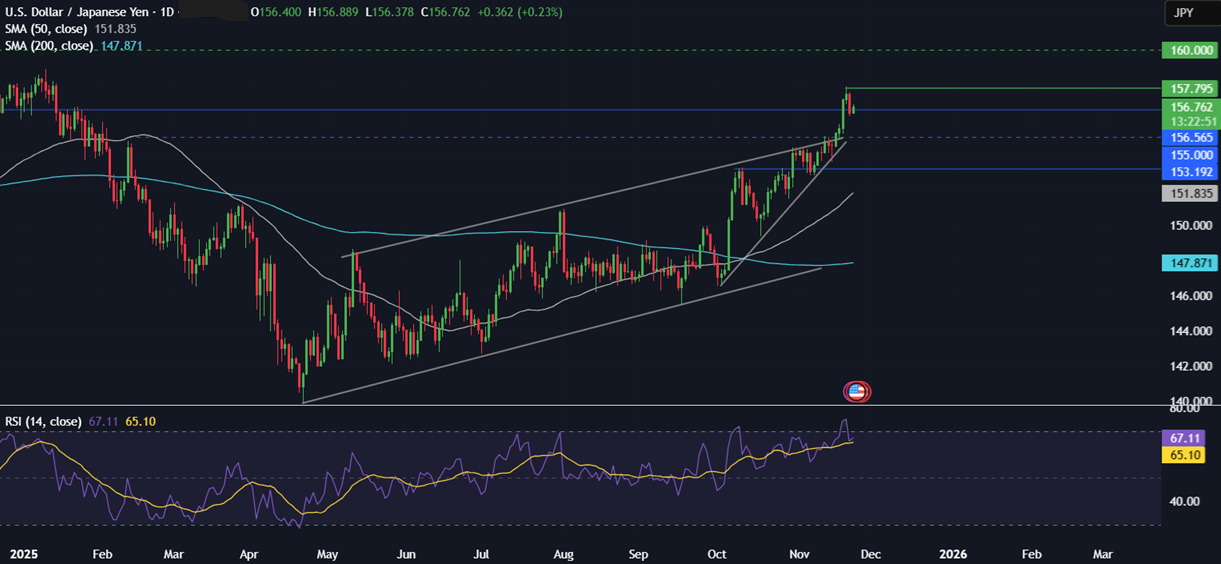
German CPI (Friday)
German inflation data is expected to show that CPI fell -0.2% MoM in November, after rising 0.3% in October. October’s annual CPI was 2.3%, down after two consecutive increases. CPI is cooling towards the ECB’s 2% target, supporting the ECB’s cautious stance on further rate cuts for now. The market considers that the ECB is done with its rate-cutting cycle. With CPI almost back to target, the central bank will focus more on growth, which appears to be moving in the right direction, albeit slowly. Recent German PMIs added to signs of improved Q4 eurozone growth. However, cooler-than-expected inflation could fuel the doves at the ECB to cut rates further, pulling EUR/USD lower.
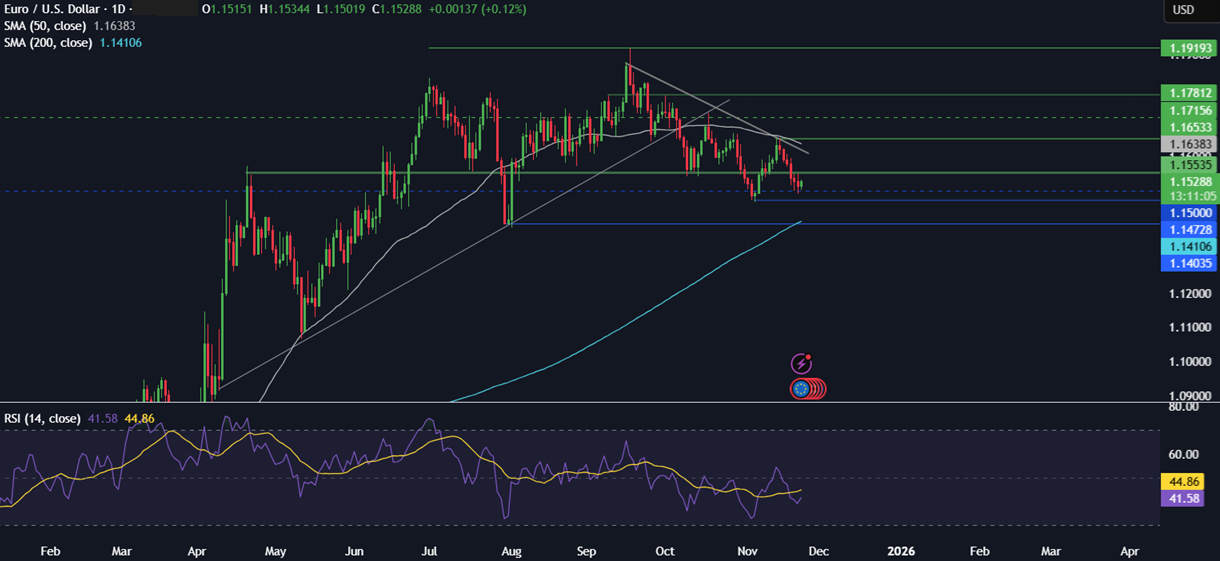
Trading involves risk.
The content provided here is for informational purposes only. It is not intended as personal investment advice and does not constitute a solicitation or invitation to engage in any financial transactions, investments, or related activities. Past performance is not a reliable indicator of future results.
The financial products offered by the Company are complex and come with a high risk of losing money rapidly due to leverage. These products may not be suitable for all investors. Before engaging, you should consider whether you understand how these leveraged products work and whether you can afford the high risk of losing your money.
The Company does not accept clients from the Restricted Jurisdictions as indicated in our website/ T&C. Some services or products may not be available in your jurisdiction.
The applicable legal entity and its respective products and services depend on the client’s country of residence and the entity with which the client has established a contractual relationship during registration.




